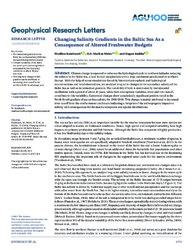Changing Salinity Gradients in the Baltic Sea As a Consequence of Altered Freshwater Budgets
DOI: https://doi.org/10.1029/2019GL083902
Persistent URL: http://resolver.sub.uni-goettingen.de/purl?gldocs-11858/9330
Persistent URL: http://resolver.sub.uni-goettingen.de/purl?gldocs-11858/9330
Kniebusch, Madline; Meier, H.E. Markus; Radtke, Hagen, 2019: Changing Salinity Gradients in the Baltic Sea As a Consequence of Altered Freshwater Budgets. In: Geophysical Research Letters, Band 46, 16: 9739 - 9747, DOI: 10.1029/2019GL083902.
 |
Dokument öffnen: |
Climate change is expected to enhance the hydrological cycle in northern latitudes reducing the salinity in the Baltic Sea, a land-locked marginal sea with a large catchment area located in northern Europe. With the help of ocean simulations forced by historical atmospheric and hydrological reconstructions and local observations, we analyzed long-term changes in the sea surface salinity of the Baltic Sea as well as its latitudinal gradient. The variability of both is dominated by multidecadal oscillations with a period of about 30 years, while both atmospheric variables, wind and river runoff, contribute to this variability. Centennial changes show a statistically significant positive trend in the North-South gradient of sea surface salinity for 1900–2008. This change is mainly attributed to increased river runoff from the northernmost catchment indicating a footprint of the anthropogenic impact on salinity with consequences for the marine ecosystem and species distributions.
Statistik:
ZugriffsstatistikSammlung:
- Geographie, Hydrologie [454]
This is an open access article under the terms of the Creative Commons Attribution License, which permits use, distribution and reproduction in any medium, provided the original work is properly cited.

